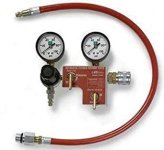Sinlessearth
New member
Hello fellow Jeepers. I am looking for a little help troubleshooting my P0302 misfire (there are no other codes). I have scoured the internet and still have some questions on the process. Here is the background. It’s 2016 JKU Sport with 115K miles. I have replaced the oil cooler housing, plugs, plenum gaskets around 100K, then housing again at 112K. This is the only engine work done so far. I always change the oil when the Jeep tells me to and use Mobil 1 full synthetic. It has never over heated or even went above mid-range. The misfire started just before the second oil cooler replacement. Also, the valve cover gasket now leaks on cylinder 4’s spark plug hole but it’s mild (discovered during 2nd cooler replacement). It is random and does go away sometimes. When cleared it will stay off for 1-3 days then pop up again until I reset it or goes away on its own. I never really noticed a rough idol until last night while sitting in a drive through however, the 1-hour drive today I didn’t notice any roughness like the night prior. Also, it still has power and will get up and go.
So far, I have moved the coil pack to cylinder 1, the spark plug (which looked fine and was gapped correctly) to cylinder 3, and the fuel injector to cylinder 6. The code still pops up, telling me these parts are not bad.
One thing to note is that when replacing the oil cooler housing the first time I noticed the wiring harness cable loom that runs to the left of the intake plenum over cylinders 1,3, & 5 (injectors and coil packs connections) had disintegrated and the wires are no longer really protected. I tried to put new loom on however, the heat destroyed that as well. I have inspected the harness connector that sits on top of the engine and didn’t find any pins recessed, bent, or corroded.
If I do a compression check and it’s good, then is it safe to assume it’s something with the wiring harness to the coil pack or injector?
Is there a good way to test the connection to the coil pack or injector for continuity or voltage drop without a special scanner?
If I do a compression check and it fails, then I need to do a leak down test or assume the head needs replaced?
If I do the leak down test, I doubt the leak would be the crankcase or coolant, but you never know. If the leak happens to be at the valves (intake or exhaust) could it be the rocker bearings or lifters? I don’t hear a real noticeable knock, but it could be faint.
What I am concerned about is doing a compression test and assuming the head is bad (not sure I can tackle that job in the amount of time I would have) and don’t want to replace the head if the lifters and rocker bearings are the real issue (which I could do). How do I know for sure it’s the head and not the rockers/lifters without replacing them and potentially wasting money and time?
Also, is the compression test done cold or warm? I have seen/read both. I believe I should pull the fuel pump fuse and burn the gas, but do I need to do anything for the spark or will leaving the coil packs unplugged be enough?
Any other recommendations/suggestions would be much appreciated.
So far, I have moved the coil pack to cylinder 1, the spark plug (which looked fine and was gapped correctly) to cylinder 3, and the fuel injector to cylinder 6. The code still pops up, telling me these parts are not bad.
One thing to note is that when replacing the oil cooler housing the first time I noticed the wiring harness cable loom that runs to the left of the intake plenum over cylinders 1,3, & 5 (injectors and coil packs connections) had disintegrated and the wires are no longer really protected. I tried to put new loom on however, the heat destroyed that as well. I have inspected the harness connector that sits on top of the engine and didn’t find any pins recessed, bent, or corroded.
If I do a compression check and it’s good, then is it safe to assume it’s something with the wiring harness to the coil pack or injector?
Is there a good way to test the connection to the coil pack or injector for continuity or voltage drop without a special scanner?
If I do a compression check and it fails, then I need to do a leak down test or assume the head needs replaced?
If I do the leak down test, I doubt the leak would be the crankcase or coolant, but you never know. If the leak happens to be at the valves (intake or exhaust) could it be the rocker bearings or lifters? I don’t hear a real noticeable knock, but it could be faint.
What I am concerned about is doing a compression test and assuming the head is bad (not sure I can tackle that job in the amount of time I would have) and don’t want to replace the head if the lifters and rocker bearings are the real issue (which I could do). How do I know for sure it’s the head and not the rockers/lifters without replacing them and potentially wasting money and time?
Also, is the compression test done cold or warm? I have seen/read both. I believe I should pull the fuel pump fuse and burn the gas, but do I need to do anything for the spark or will leaving the coil packs unplugged be enough?
Any other recommendations/suggestions would be much appreciated.

